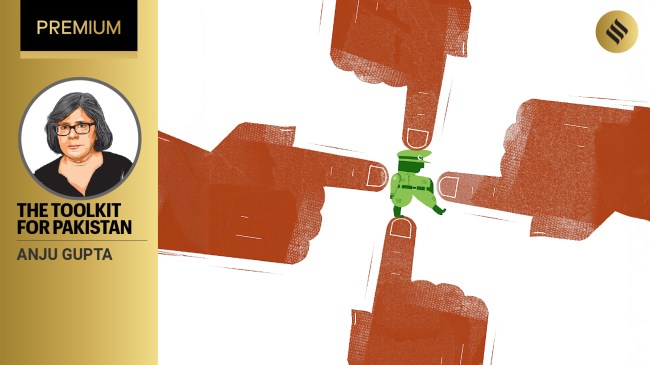Opinion What can India do to get Pakistan to give up its policy of ‘proxy wars’?
This will be a long haul and will require mature public diplomacy within and outside of India, even as other institutions continue to play their part in defending India
 The Pakistan army deliberately follows policies to harm neighbours and bring defensive retaliation upon itself. Then it publicly plays up the possibility of retaliation or threat thereof in order to support its narrative that only the army, not the corrupt polity, can hold Pakistan together. (C R Sasikumar)
The Pakistan army deliberately follows policies to harm neighbours and bring defensive retaliation upon itself. Then it publicly plays up the possibility of retaliation or threat thereof in order to support its narrative that only the army, not the corrupt polity, can hold Pakistan together. (C R Sasikumar) Any strategic analysis of the current situation vis-a-vis Pakistan needs to be based on four fundamental questions: Can we press control+alt+delete on Pakistan from India’s strategic vision of security, stability and prosperity for all her people? What is the current reality of the state of Pakistan? What is the current geopolitics of the region? Can India muster the patience to use global networks to navigate the complexities of Pakistan to establish peace with it?
A neighbour can’t just be wished away from the strategic vision of a nation like India that is steadily progressing on the path of growth and prosperity. Making peace with a neighbour is rewarding, pragmatic and smart politics — it is not a weakness. The current wars in Ukraine and Gaza are prime examples of failures to do so.
Pakistan’s army has wielded extra-constitutional power for decades and fully controls its security and foreign policies. Historically, this institution has manipulated the polity and elections to install favourable actors in high positions in the government, bureaucracy, judiciary, and its own higher echelons. It has appropriated for itself the tag of the “eternal saviour”, for decades protecting Pakistan from “eternal enemy” India, and from Afghanistan, a newer enemy. The army deliberately follows policies to harm neighbours and bring defensive retaliation upon itself. Then it publicly plays up the possibility of retaliation or the threat thereof in order to support its narrative that only the army, not the corrupt polity, can hold Pakistan together. This vicious cycle has continued for decades.
Although former prime minister Imran Khan was earlier a beneficiary of the army’s machinations, he has challenged the establishment by calling its bluff. Khan’s passionate and brutally honest exhortations have taken the sheen off the army’s top brass, especially General Asim Munir. The former PM has been locked up for many months, but his messages continue to resonate in Pakistan. In March, two US lawmakers introduced the Pakistan Democracy Act, seeking to sanction Munir for engaging in the “wrongful prosecution and imprisonment” of political opponents, including Imran Khan. US pressure seems to be building up on the Army Chief and so, he too wants to shift the focus of debate with respect to Pakistan.
At home, the army is seen as failing to ensure security in the border states of Balochistan and Khyber Pakhtunkhwa, where following the withdrawal of US troops from Afghanistan, hundreds of casualties among security forces are being reported annually. Hard targets such as army bases, cantonments and fortified headquarters are being frequently targeted by Pakistani militants. In this context, the hijacking of the Pakistani passenger train, the Jaffar Express, by Baloch militants on March 11, with hundreds of people being taken hostage, came as a huge embarrassment for the army. The militants segregated security personnel and civilians after checking their identity cards and killed only security personnel. The standoff continued for 36 hours. Using its usual playbook, in a long press conference, the army media wing laboured hard to prove that India and Afghanistan had helped in perpetrating this attack. The language used set the stage for a revenge attack. The brazen comments made by Munir a few days ago, referring to Kashmir as Pakistan’s “jugular vein” and saying that “Kashmiris have not been forgotten” were almost like a threat that seems to have actualised in the horrific attack in Pahalgam on April 22. In addition, he shamelessly made communal comments with the clear intention to provoke a far-right frenzy in India, which in turn could potentially create even a “constituency of victims” for Pakistan to recruit from.
A new factor that Pakistan is trying to exploit is the chill between India and Bangladesh. The relatively weak dispensation in Dhaka may not be able to prevent the growth of the radical networks that Pakistan could nurture for its own interests. However, the coldness will harm both sides. Though China and India are pragmatically moving forward to resolve issues, as long as the Chinese forces continue to be active on our borders, it’s advantage Pakistan.
It is not hard to imagine that there will be security, intelligence, kinetic and diplomatic responses to the situation arising from the Pahalgam attack. However, it would be equally rewarding to tie Pakistan down with effective global partnerships. One partnership that succeeded in tying it down for three years was under the FATF regime. The US under Trump 1.0 took the lead in putting Pakistan on the grey list in June 2018. This caused financial hardships for a country in dire need of economic assistance, with the International Monetary Fund making delisting a condition for releasing the remaining part of the $6 billion package. Under FATF pressure, the Pakistan army released Taliban co-founder Abdul Ghani Baradar to facilitate the US-Taliban talks in Doha. Big-ticket attacks on hard targets in Jammu and Kashmir decreased drastically from mid-2018 to early 2021, with the exception of the Pulwama attack. Further, Pakistan was forced to arrest and convict top LeT leaders like Hafiz Saeed and the mastermind of the Mumbai attack, Sajid Mir. Pakistan was then taken off the FATF grey list and from there on, seems to have gone back to its proxy games.
India’s regional and global strategic partnerships can also be moved to address the realities of Pakistan and generate the combined resources that can get Pakistan to give up its policy of proxy wars. This will be a long haul and will require mature public diplomacy within and outside India, even as other institutions continue to play their part in defending the country. The reality is that Pakistan can neither be wished away nor looked at in isolation. In an increasingly interconnected world, India can surely tap into its networks and strengths to deal squarely with Pakistan.
The writer is a security analyst and former director general of police




